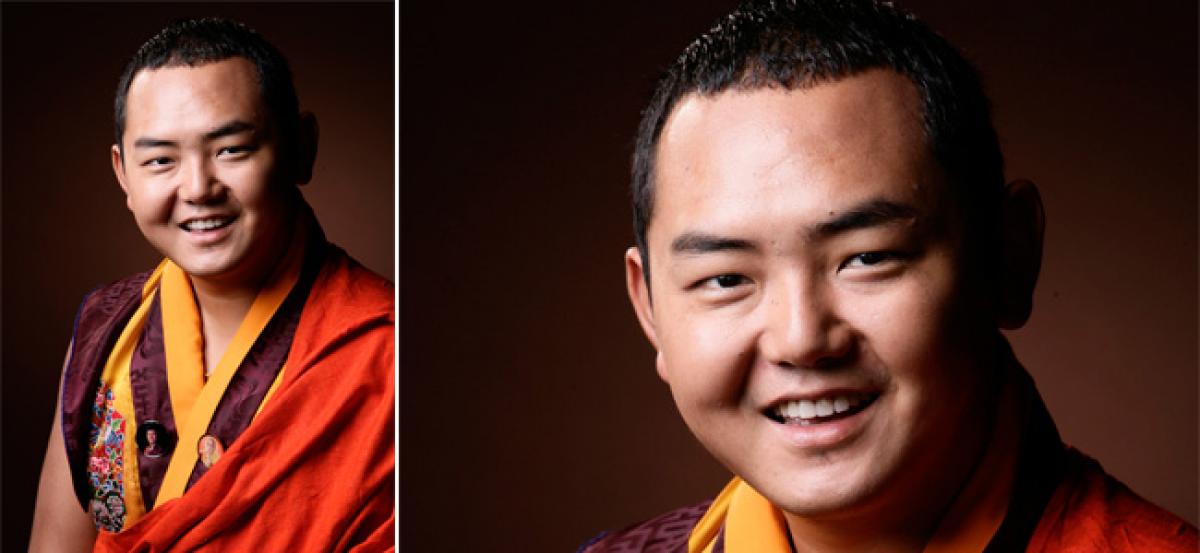Live
- India Faces Blow as Pacer Mohammed Shami Ruled Out for Remainder of Australia Series
- Biden Pardon: Joe Biden Commutes Death Sentences of 37 Inmates, Including Child Killers and Mass Murderers
- South Korea: Yoon believes impeachment trial takes priority over martial law probe
- Strict Action for Non-Adherence to Time Management - DMHO Dr. Swarajya Lakshmi
- Over 13.29 lakh houses approved for rural poor in Maharashtra: Shivraj Chouhan
- District Collector Urges Timely Completion of Indiramma Housing Scheme Survey
- Digital Arrest Scam: Hyderabad Man Duped of ₹7 Lakhs by Fake Crime Branch Police Callers
- Sukhbir Badal seeks President's Police medal for officer who saved his life
- US Firm Accordion Acquires Merilytics, Launches 1,500-Seater Office in Hyderabad
- Free Medical Camp Organized by Alampur Advocate Bar Association
Just In
For this Buddhist monk, happiness is a sense of satisfaction within


He knows travel is the best teacher and when the destination is spirituality, the experience is more than just sightseeing. It helps you pack young and vibrant viewpoints in your intellectual bag of traditional Buddhist teachings.
He knows travel is the best teacher and when the destination is spirituality, the experience is more than just sightseeing. It helps you pack young and vibrant viewpoints in your intellectual bag of traditional Buddhist teachings.
He's the young spiritual leader Gyalwa Dokhampa, who believes Buddhism is not a religion but a way to find happiness. How important is materialistic happiness in your life, asks the spiritual leader, who has lived most of his adult life in the 21st century.
"Many people want to become rich or become successful. Why do we want to become successful? Because we believe that by becoming successful we would be happy and comfortable," he explains.
In an interaction with this IANS correspondent in his Druk Ralung Shedrup Choling Monastery in the hills overlooking this Bhutanese capital, he says: "If I ask you: Would you be willing to sacrifice all spiritual happiness or happiness of the mind in exchange for materialistic gains and fame?"
"By happiness of the mind, I am referring to friendship, sense of satisfaction and sense of tolerance to others and people's faults."
Explaining how the chase for happiness works, he says: "We want something because we think that it will make us happy. We go for it. When we get it, it is not enough and it doesn't make us happy. We want something else and we get that. We need something else again."
"Young people," he says, "will think that the old people who are successful must be happy. Old people are still chasing after something they feel is significant. So all our life we may be chasing after happiness and never getting it."
"And in the process of getting that happiness, we sacrifice our friendship, our emotions and our health and life. We might end up sacrificing everything and not getting anything," the 36-year-old spiritual leader says.
The Gyalwa Dokhampa is a family member of the Gyalwang Drukpa and has been recognised by Tibetan spiritual leader the Dalai Lama as the ninth Gyalwa Dokhampa. Based in Bhutan and Nepal, he teaches worldwide and brings a young viewpoint to traditional teachings.
The Buddhist monk, who believes that the source of all happiness and pain is none other than one's own mind, asks: "Does happiness come from a sense of satisfaction or from external, something outside?"
"If someone gives you a million dollars, you will be very happy. Why are you happy? You will say it's because of the million dollars. But then, imagine after 10 days, you find out that you have cancer and to cure that, you have to pay one million dollars. You would happily give out a million dollars.
"So again, the question is: Does happiness come from the million dollars or from a sense of satisfaction? Does having a million dollars make one successful? We all want to be successful but not everyone is going to become a billionaire or a millionaire. Does it mean we are all failures? That kind of success is external success; at the same time, we need internal happiness to have appreciation and a sense of satisfaction about life and by being aware of present moments of life."
As a spiritual teacher, he loves to interact with the youth on preserving the environment. "During our walking experience in Ladakh in the Himalayas, we saw how much rubbish trekkers left behind which went into the water streams. These water streams are the source of about 30 to 40 per cent of the world population. Our goal was to pick up all of the non-biodegradable garbage," he says.
According to the Gyalwa Dokhampa, this Himalayan kingdom and Ladakh in Jammu and Kashmir in India have strong historic relations dating to over 300 years. As a spiritual leader with a deep commitment to action, the Gyalwa Dokhampa, who spent his initial years in Darjeeling in India and shared his knowledge with students in the US, Europe, Vietnam, Malaysia, Hong Kong and Singapore, has published numerous books of interest.
His latest book, "The Restful Mind -- A new Way of Thinking, A New Way of Life", portrays the pressures of modern life and is a perfect guide to achieve a restful mind.

© 2024 Hyderabad Media House Limited/The Hans India. All rights reserved. Powered by hocalwire.com






